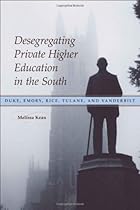Read Desegregating Private Higher Education in the South: Duke, Emory, Rice, Tulane, and Vanderbilt by Melissa Kean Online
^ Read * Desegregating Private Higher Education in the South: Duke, Emory, Rice, Tulane, and Vanderbilt by Melissa Kean ↠ eBook or Kindle ePUB. Desegregating Private Higher Education in the South: Duke, Emory, Rice, Tulane, and Vanderbilt The Brown v. Board members--usually comprised of professional, white, male alumni--reacted strongly to threats against southern white authority and resisted determinedly any outside attempts to impose desegregation.The grassroots civil rights movement created a national crisis of conscience that led many individuals and institutions vital to the universities' survival to insist on desegregation. S. Board of Education decision in 1954 gave the desegregation debate a sense of urgency and also infl

| Title | : | Desegregating Private Higher Education in the South: Duke, Emory, Rice, Tulane, and Vanderbilt |
| Author | : | |
| Rating | : | 4.24 (865 Votes) |
| Asin | : | 0807133582 |
| Format Type | : | paperback |
| Number of Pages | : | 352 Pages |
| Publish Date | : | 2015-07-18 |
| Language | : | English |
Thoroughly researched and attractively written, it is a welcome addition to the scholarly literature." -- Journal of Southern History In Desegregating Private Higher Education in the South, Melissa Kean explores how leaders at five of the region's most prestigious private universities -- Duke, Emory, Rice, Tulane, and Vanderbilt -- sought to strengthen their national position and reputation while simultaneously answering the increasing pressure to end segregation.University Board members -- usually composed of professional, white, male alumni -- reacted strongly to threats against southern white authority and resisted determinedly any outside attempts to impose desegregation. The schools felt enormous pressure to comply as foundations withheld funding, accrediting bodi
Melissa Kean is Centennial Historian at Rice University.
The Brown v. Board members--usually comprised of professional, white, male alumni--reacted strongly to threats against southern white authority and resisted determinedly any outside attempts to impose desegregation.The grassroots civil rights movement created a national crisis of conscience that led many individuals and institutions vital to the universities' survival to insist on desegregation. S. Board of Education decision in 1954 gave the desegregation debate a sense of urgency and also inflamed tensions -- which continued to mount into the early 1960s. After World War II, elite private universities in the South faced growing calls for desegregation. These tensions and the boards' res
Download Desegregating Private Higher Education in the South: Duke, Emory, Rice, Tulane, and Vanderbilt
Download as PDF : Click Here
Download as DOC : Click Here
Download as RTF : Click Here
